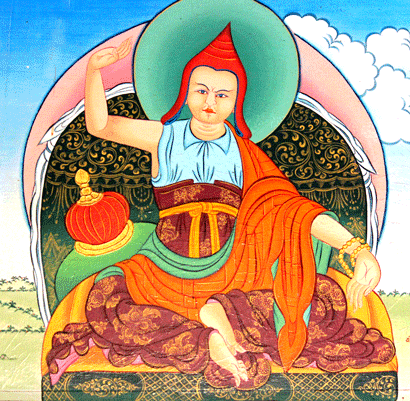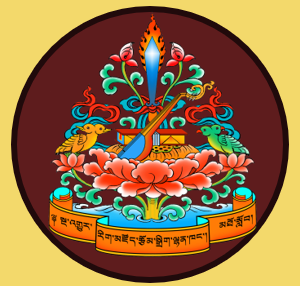
Acharya Dignaga was born to the Brahmin caste in Simhavakta near Kanchipuram district in present day Tamil Nadu, south India. He took his monastic vows from Abbot Nagadatta, the holder of the Vatsiputriya School, who was very skilled in all the tirthika tenets. Having mastered the three pitakas of the Shravakas, Dignaga requested the abbot for instruction. As per his request, the abbot advised him to search out the truth of the inexpressible self. He contemplated day and night but could not see the truth. He opened the windows during the day and lit lamps in the four directions at night; he stripped his body naked and looked everywhere in search of this truth. On seeing this, his friend told the abbot about it. When the abbot questioned Dignaga, he replied that he was dull and had a low intellect; he could not find the inexpressible self that the abbot had asked him to search for. Therefore, he looked around wondering whether it was obscured by any hindrance. When he presented even the reasoning that negates it, the abbot became angry and expelled him even though he was not liable for expulsion. It was improper of him to disprove his teacher’s reasoning in spite of being capable; he prostrated and left.
Sometime after, Dignaga went before Acharya Vasubhandu and received all the teachings on the Mahayana and Hinayana pitakas. It is known that he understood about five hundred Mahayana and Hinayana sutras, as well as dharanis and mantras. Specifically, he received a vidya mantra from a tantric master. By accomplishing it, he had a vision of Arya Manjushri. He received teachings from Manjushri according to his wishes. He stayed inside the isolated cave on Bhotashela Hill near Odivisha (Orissa) where he endeavoured in single-pointed concentration.
After some years passed, there was a big dispute with the tirthikas in Nalanda. Brahmin Sudurajaya was there, a logician who, having accomplished his deity, was extremely skilful and seemingly undefeatable. Acharya Dignaga was invited from the south, as the Buddhists were not able to debate against Brahmin Sudurajaya. Acharya Dignaga defeated the tirthikas three times and refuted each of the opponents assembled there. He turned them to Buddhism. He then taught many sutras to the sangha, wrote many volumes on Yogachara doctrine and caused the Abhidharma to flourish there. He also composed many small treatises on Chittamatra and logic. It is known that he composed around a hundred treatises in total.
Once again, Acharya Dignaga returned to his cave near Odivisha and devoted himself to meditation. Intending to compile all the scattered treatises he composed before as one, he wrote with stone dust the following homage verse and assertion from the Compendium of Valid Cognition:
After paying homage to the Buddha Sugata,
The genuine benefactor of all beings,
For establishing the truth, I have compiled all my scriptures
And unified everything dispersed into one.
At the same time as he wrote this, the earth trembled as a good omen, all the directions were filled with spectral lights and a melodious sound was heard. A Brahmin named Nagpo believed that this miracle was because of him. When the Acharya went begging for alms, the Brahmin came and erased what the Acharya had written. The Acharya wrote it again, and again Nagpo erased it. Before the Brahmin came a third time the Acharya wrote:
If you are erasing this for fun or a joke,
Then please don’t erase it as it has a great purpose.
In case there are mistakes in the meaning and you wish to debate,
Come forth and show yourself.
When Acharya Dignaga was out begging for alms, the Brahmin again came to erase the verse but instead he sat down after seeing these words. The Acharya came back and defeated the tirthika many times. When the Acharya told him to follow Buddhism, the tirthika threw dust blessed by mantra, which burned the Acharya’s belongings. Just as the Acharya himself was almost burnt, the tirthika departed. Acharya Dignaga started to abandon bodhichitta thinking that if he was not capable of this, then how would he be capable of benefitting others. Just then, Arya Manjushri appeared before him and said,
Son, don’t do this. Encountering low people causes evil thoughts.
Know that the host of tirthikas cannot harm your treatise.
I will be your spiritual guide until you attain Enlightenment.
Later, this will be the single eye of all treatises.
The Acharya replied,
It is difficult to keep this in mind while undergoing unbearable sufferings;
The mind as well inclines towards bad conduct.
Sublime beings are difficult to meet; even if I have your vision
What should I do without your blessings?
Then Manjushri said,
Son, please don’t be unhappy.
I will guard you in all painful situations.
Promising thus, Arya Manjushri disappeared. From then, Acharya Dignaga composed many treatises perfectly.
Once when he got sick, after begging for alms in the town, he stayed in the forest and fell asleep. In a dream, he had visions of many Buddhas and attained many samadhis. Outside, the gods poured down a rain of flowers. The flowers of the forest bowed down and the elephants served as cool shade. Just as a king and his entourage came to the forest for recreation, they were amazed to see this and woke Acharya Dignaga up with the sound of cymbals. When he was asked whether he was Acharya Dignaga, he replied he was. The king prostrated to his feet.
From there, the Acharya went towards the southern region. He vanquished almost all the non-Buddhist defenders from different regions. He restored nearly all the ruined monasteries established by the past Acharyas. Once again, he turned Bhadrapalita, the minister of the king of Odivisha, to Buddhism. The Brahmin Bhadrapalita built sixteen monasteries. In each of these, he established a large sangha. The Acharya revived the dried tree of Brahmin Mukhti-haritaka which was capable of healing all ailments, useful to many people, after making aspirational prayers for seven days.
In this way, by defeating almost all opponents, he was renowned as the king of debate. Disciples connected with dharma filled all directions. With contentment and few desires, abiding in the twelve ascetic virtues throughout his lifetime, he then passed away in an isolated forest of Odivisha.
Series to be continued…
By Karma Sangmo
Final Year, NNNI


